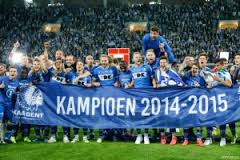By Samindra Kunti
May 22 – In July 2013 KAA Gent chairman Ivan De Witte inaugurated the Ghemlanco Arena with the promise that his club would become champions within the next five seasons. It was perceived as grandiloquence and bluff, bordering on megalomania, but yesterday’s 2-0 victory against Standard de Liege, propelling De Witte’s club to a first-ever title, proved De Witte was not bluffing. Gent’s success is the result of the modernisation of a once troubled club.
Gent was founded as an athletics club, ‘Société Gymnastique la Gantoise’, in 1864. The students of a local college then added a football section to the club at the turn of the century. In the past, Gent’s achievements have been limited: three Belgian Cups and a decent run in the UEFA Cup in the early 90s. The Belgians defeated Lausanne Sports, Eintracht Frankfurt and FC Dynamo Moscow before faltering in the quarterfinals against Ajax Amsterdam.
But at the end of the 90s then coach Johan Boskamp dropped a bomb by declaring that the club were more than BFr 800 million (about €23 million) in debt after a row with chairman Jean Milders, who was accused of financial mismanagement.
Ivan de Witte, a businessman and current CEO of Hudson Benelux, and Michel Louwagie were put in charge of the uphill task to save the club and implement austerity measures. De Witte’s friend and chairman of the board of directors of bank VDK Spaarbank, Franck Verheeke, aided KAA Gent by allowing for favorable loans at crucial times and the consolidation of the outstanding debts under good terms.
But Gent was saved by more than just a friendly banker. General manager Michel Louwagie developed a knack of attracting good players and selling them on at a premium. His transfer policies resulted in the sale of Mbark Boussoufa for €4 million to Anderlecht, Bryan Ruiz for €5.5 million to FC Twente and Nicolas Lombaerts for €4 million to Zenit St. Petersburg among others. The surpluses from transfers allowed Gent some breathing space.
At the same time results were disappointing. Gent never competed for the big prizes and the malaise transformed the club into a graveyard for coaches, with the likes of Victor Fernandez and Mircea Redniz among others, all failing in the pressure seat.
The duo of De Witte and Louwagie continued with the rehabilitation of their club. They announced that Gent was financially healthy again and dreamed big at the same time. The construction of new stadium would lift KAA Gent indefinitely out of the financial bog and thrust the club to greater heights on the pitch. Gent left the Ottenstadion in 2013 for the multi-use Ghemlanco Arena, a modern 20,000 all-seater stadium built for €80 million.
The Flemish government invested in the new venue, the city of Gent aided by contributing €18.5 million through TMVW, an intercommunal water company. The club borrowed €30 million to finance its new temple. It was another risky move by Gent’s management, but this season’s attendance numbers suggest they got it right. The Ghemlanco Arena is rapidly becoming KAA Gent’s cash-machine. The average attendance has increased from 10,500 to 18,500 fans with 14,000 season ticket holders. This season’s revenue is projected to be €32 million with a profit of €1.5 million, last season the revenue was €28.5 million, at the Ottenstadion only €20,5 million.
Coach Hein Vanhaezebrouck has a worked a miracle this season. Last season Gent failed to even qualify for the play-offs.
Vanhaezebrouck was a mediocre player with Harelbeke and Lokeren during his career, but from the touchlines he has managed to guide KAA Gent to domestic glory. He moulded a talented group of players – centre-back Rami Gershon, who had a brief spell with Celtic; local favorite Benito Raman, whose quick footwork stands out; midfielder Sven Kums, who wears the captain’s armband; striker Laurent Depoitre, who is the leading goalscorer with 13 goals and Brecht Dejaegere – into a championship-winning outfit.
Rather unexpectedly Vanhaezebrouck may find himself locking horns, tactically, with Jose Mourinho and Pep Guardiola in the Champions League next season as the Belgian champions qualify directly for UEFA’s flagship club competition. KAA Gent may not stand much of a chance against Europe’s elite yet, but the club’s immediate concern is rather to get its budget level with Anderlecht and Club Brugge, the two traditional powerhouses at home. The Champions League campaign will generate €15-18 million and will help in that respect.
For now though, Gent can revel in victory, but De Witte and Louwagie will ensure the club doesn’t lose its head.
In January 19-year-old winger Moses Simon joined Gent for just €800,000 from Trencin of Slovakia. He proved to be an immediate hit, displaying skill, pace and a nose for goal. Louwagie doesn’t consider transfer profits as structural income, but has claimed Moses should be sold on for €20 million. Words coming from Gent are neither considered to be grandiloquence nor bluff anymore, rather as prophecies of sound financial management.
Contact the writer of this story at moc.l1745042101labto1745042101ofdlr1745042101owedi1745042101sni@i1745042101tnuk.1745042101ardni1745042101mas1745042101

